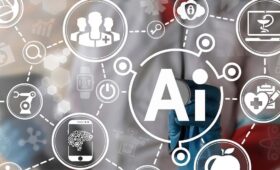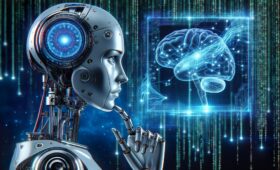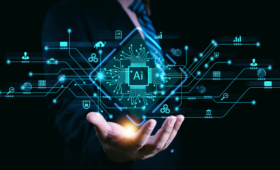Artificial Intelligence (AI) has already transformed the way we interact with technology, influencing everything from healthcare and finance to entertainment and education. As we look toward the future, AI promises to continue its evolution, reshaping industries, economies, and even societies in ways we are only beginning to understand. But what exactly is the future of AI, and how will it affect our lives in the years to come?
The Rise of Autonomous Systems
One of the most exciting aspects of AI’s future is the development of autonomous systems. These intelligent machines can operate without human intervention, making decisions based on data, patterns, and algorithms. From self-driving cars to automated drones, the rise of autonomous systems could revolutionize transportation, logistics, and even the military sector.
Autonomous vehicles, for example, have the potential to reduce traffic accidents, improve fuel efficiency, and create more sustainable transportation networks. In the future, we may see a widespread adoption of self-driving cars, trucks, and delivery vehicles, fundamentally altering how goods and people move across the globe.
AI in Healthcare: A Game Changer
In healthcare, AI is set to play an even more prominent role. From early diagnosis to personalized treatment plans, AI has the potential to save lives by enhancing medical care. Machine learning algorithms can analyze large sets of medical data, identifying patterns that human doctors might miss. This can lead to faster diagnoses, more accurate predictions, and improved treatment outcomes.
AI-powered tools like robotic surgeons are already assisting doctors in performing complex surgeries with greater precision. In the future, AI could help in discovering new drugs, accelerating the development of treatments, and even predicting outbreaks of diseases before they spread.
The Role of AI in Business
AI’s integration into business is another area where we can expect tremendous growth. From customer service chatbots to predictive analytics, AI is making businesses more efficient and customer-centric. Machine learning algorithms can analyze customer behavior, predict trends, and optimize marketing strategies, making it easier for companies to deliver tailored experiences to their clients.
As AI continues to evolve, we can expect more businesses to adopt AI tools to streamline operations, reduce costs, and improve productivity. Industries like manufacturing, finance, retail, and logistics are already reaping the benefits of AI technology, and this trend is only expected to grow.
Ethical Considerations and AI Regulation
As AI becomes more powerful, it also raises important ethical questions. Issues such as privacy, bias, and the potential for job displacement will need to be addressed as AI continues to shape our world. AI systems can inadvertently perpetuate existing biases if they are trained on biased data, leading to unfair outcomes in areas like hiring or law enforcement.
To address these challenges, governments and organizations must work together to establish ethical guidelines and regulations that ensure AI is used responsibly. Transparency, accountability, and fairness will be key factors in developing AI systems that benefit society as a whole.
AI and the Workforce
The future of AI in the workforce is a topic of much debate. While AI has the potential to automate many tasks, which could lead to job displacement in certain sectors, it also opens up opportunities for new kinds of work. As AI takes over repetitive and manual tasks, human workers can focus on more creative, strategic, and complex roles that require emotional intelligence and critical thinking.
Education and reskilling will be crucial in preparing the workforce for an AI-driven economy. By fostering a culture of continuous learning, individuals can stay ahead of the curve and adapt to the changing demands of the job market.
The Future of AI-Powered Creativity
One of the more intriguing possibilities for AI’s future lies in its ability to enhance creativity. AI is already being used in fields like music, art, and writing, assisting creators in generating new ideas and exploring new forms of expression. AI-driven tools can help artists create stunning visuals, compose original music, and even write stories or poetry.
In the future, AI could collaborate with humans to push the boundaries of artistic expression and innovation. Imagine an AI that helps write a novel, designs architecture, or even creates new forms of entertainment that we haven’t yet imagined.
AI in Everyday Life
As AI technology advances, it will become increasingly integrated into our everyday lives. Virtual assistants like Siri, Alexa, and Google Assistant are already familiar tools that rely on AI to help us manage tasks, get information, and control smart devices. In the future, we can expect even more personalized and intuitive AI systems that understand our preferences, habits, and needs.
AI could also play a key role in the smart home revolution, with AI-powered devices that anticipate our needs and optimize our environment for comfort, efficiency, and security.
The Road Ahead: Challenges and Opportunities
While the future of AI is full of exciting possibilities, it also comes with challenges. As AI becomes more advanced, ensuring that its development is safe, ethical, and aligned with human values will be crucial. We must work to mitigate risks such as job displacement, bias in AI systems, and the potential for misuse of AI technologies.
The road ahead for AI is paved with both opportunities and challenges. If we can navigate these issues and harness the full potential of AI, we can look forward to a future where intelligent machines work alongside humans to improve quality of life, drive innovation, and solve some of the world’s most pressing problems.
Conclusion
AI’s future is an exciting and dynamic one. With the rapid pace of technological advancements, it’s impossible to predict exactly where AI will take us, but we can be sure it will be transformative. From healthcare and business to art and entertainment, AI is poised to play a central role in shaping the future. The key will be ensuring that as AI evolves, it does so in a way that benefits society as a whole, creating a future where humans and machines work together for the greater good.
As we look forward to the future of AI, it’s clear that this technology has the potential to reshape every aspect of our lives. The question is not whether AI will change our world—it’s how we will guide its development to ensure that it benefits us all.




